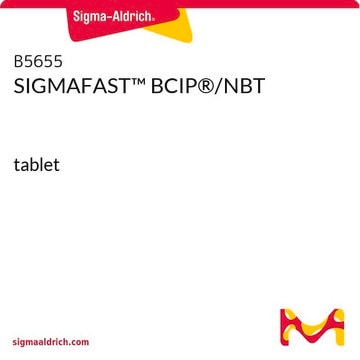11681451001
Roche
NBT/BCIP Stock Solution
Sinónimos:
5-bromo-4-chloro-3-indoyl phosphate, BCIP
Iniciar sesiónpara Ver la Fijación de precios por contrato y de la organización
About This Item
UNSPSC Code:
12352204
Productos recomendados
form
solution
Quality Level
mol wt
817.7
packaging
pkg of 8 mL
manufacturer/tradename
Roche
storage temp.
2-8°C
General description
The reaction product has a blue color and is insoluble in water. The blue color can be visually seen.
Formulas: NBT: C40H30Cl2N10O6, BCIP: C8H6NO4BrClP x C7H9N
Evaluation: visually
Formulas: NBT: C40H30Cl2N10O6, BCIP: C8H6NO4BrClP x C7H9N
Evaluation: visually
Application
- The solution is used for the sensitive detection of alkaline phosphatase (AP) in blotting protocols, including: Southern blot
- Northern blot
- Western blot
- Colony and plaque lifts
- In situ hybridization
- and for applications in immunohistochemistry and immunocytochemistry.
Physical form
Solution of 18.75 mg/ml nitro blue tetrazolium chloride and 9.4 mg/ml 5-bromo-4-chloro-3-indolyl-phosphate, toluidine-salt in 67% (DMSO) (v/v).
Note: The color of the solution can vary from yellowish to light brown.
Note: The color of the solution can vary from yellowish to light brown.
Preparation Note
Working solution: Preparation of staining solution
Always prepare this solution fresh shortly before use.
Always prepare this solution fresh shortly before use.
- For all applications except DIG System: Add 200 μl of the stock solution to 10 ml 0.1 M Tris-HCl, pH 9.5 (20 °C), 0.1 M NaCl, 0.05 M MgCl2.
- For DIG System applications: Add 200 μl of the stock solution to 10 ml 0.1 M Tris-HCl, pH 9.5 (20 °C), 0.1 M NaCl
Other Notes
For life science research only. Not for use in diagnostic procedures.
Storage Class
12 - Non Combustible Liquids
wgk_germany
WGK 1
flash_point_f
does not flash
flash_point_c
does not flash
Certificados de análisis (COA)
Busque Certificados de análisis (COA) introduciendo el número de lote del producto. Los números de lote se encuentran en la etiqueta del producto después de las palabras «Lot» o «Batch»
¿Ya tiene este producto?
Encuentre la documentación para los productos que ha comprado recientemente en la Biblioteca de documentos.
Los clientes también vieron
Jaroslav Fabik et al.
Biology open, 9(6) (2020-07-04)
Cranial neural crest cells (cNCCs) originate in the anterior neural tube and populate pharyngeal arches in which they contribute to formation of bone and cartilage. This cell population also provides molecular signals for the development of tissues of non-neural crest
João L Q Durigan et al.
Muscle & nerve, 49(1), 120-128 (2013-04-30)
Neuromuscular electrical stimulation (NMES) is used to improve quadriceps mass after anterior cruciate ligament (ACL) injury. We studied the effect of NMES on mRNA levels of atrophy genes in the quadriceps muscle of rats after ACL transection. mRNA levels of
Garth R Ilsley et al.
Scientific reports, 10(1), 4961-4961 (2020-03-20)
Single-cell RNA-seq has been established as a reliable and accessible technique enabling new types of analyses, such as identifying cell types and studying spatial and temporal gene expression variation and change at single-cell resolution. Recently, single-cell RNA-seq has been applied
Morgan Haugen et al.
Cold Spring Harbor protocols, 2010(10), pdb-pdb (2010-10-05)
Blood-feeding mosquitoes, including the dengue and yellow fever vector Aedes aegypti, transmit many of the world's deadliest diseases. Such diseases have resurged in developing countries and pose clear threats for epidemic outbreaks in developed countries. Recent mosquito genome projects have
Rebecca McLennan et al.
Developmental biology, 339(1), 114-125 (2009-12-29)
The neural crest is an excellent model to study embryonic cell migration, since cell behaviors can be studied in vivo with advanced optical imaging and molecular intervention. What is unclear is how molecular signals direct neural crest cell (NCC) migration
Protocolos
Nuestro equipo de científicos tiene experiencia en todas las áreas de investigación: Ciencias de la vida, Ciencia de los materiales, Síntesis química, Cromatografía, Analítica y muchas otras.
Póngase en contacto con el Servicio técnico












